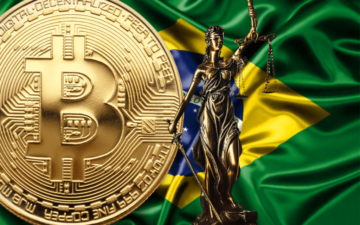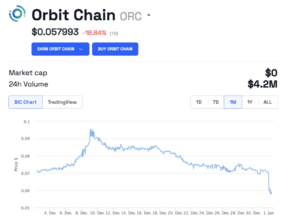
- As the crypto industry grows and matures, creating a legal framework that can balance innovation with consumer protection and financial stability is necessary.
- The challenges regulators face include determining how to classify cryptocurrencies under existing legal frameworks, ensuring Anti-Money Laundering AML and Know-Your-Customer KYC compliance, and addressing concerns over investor protection and market stability.
- It is important for stakeholders, including regulators, industry participants, and investors, to work together to shape the regulatory landscape.
Cryptocurrencies and blockchain technology have emerged as a major disruptor in the global financial system. The decentralized and distributed nature of these technologies has the potential to revolutionize traditional financial systems, but they also pose unique challenges in terms of regulation. As the crypto industry grows and matures, creating a legal framework that can balance innovation with consumer protection and financial stability is necessary.
Crypto Regulation: The Current State of Affairs
The regulatory landscape for cryptocurrencies and blockchain technology varies widely around the world. Some countries have taken a proactive approach to regulating the crypto industry, while others have banned cryptocurrencies altogether. The challenges regulators face include determining how to classify cryptocurrencies under existing legal frameworks, ensuring Anti-Money Laundering AML and Know-Your-Customer KYC compliance, and addressing concerns over investor protection and market stability.
In the United States, the regulatory environment for cryptocurrencies has been in a state of flux. The Securities and Exchange Commission (SEC) has been grappling with classifying cryptocurrencies and tokens under securities laws, while the Commodity Futures Trading Commission (CFTC) has taken a more permissive approach. Similarly, the Internal Revenue Service (IRS) has struggled to determine how to tax cryptocurrencies, leading to confusion and uncertainty for investors.
In Europe, countries such as Malta and Estonia have been at the forefront of embracing cryptocurrencies and blockchain technology. Malta has established itself as a hub for crypto exchanges and has passed several pieces of legislation to provide clarity and regulatory certainty for the industry. Estonia has also been proactive in promoting the adoption of blockchain technology and has launched several initiatives to encourage innovation in the sector.
China has taken a hardline approach to cryptocurrencies in Asia, banning ICOs and cryptocurrency exchanges. On the other hand, Japan has embraced cryptocurrencies and passed a law regulating cryptocurrency exchanges. South Korea has also taken steps to regulate cryptocurrencies, although it has been more cautious in its approach.
In Africa, the reception has been mixed. North African countries moved to ban cryptocurrency after Morrocco kicked off the trend. The majority of African countries placed a ban on cryptocurrency trading. Most are implicit bans, while some countries have gone to the extreme and outright banned it. However, it’s not all bad news. The Central African Republic became the first to accept Bitcoin as legal tender. Sydafrika reglerade kryptovalutor under sin lag om finansiella tillgångar. This also covers crypto asset service providers such as exchanges and wallets. Namibia lifted its crypto ban allowing willing parties to settle transactions in cryptocurrency. Kenya moved to bring cryptocurrency into the fold by taxing cryptocurrency gains. Nigeria launched Africa’s first Central Bank Digital Currency (CBDC).
Utmaningar i kryptoregleringen
Att reglera kryptovalutor kan vara utmanande av flera anledningar:
Decentralisering
Kryptovalutor fungerar på decentraliserade nätverk, såsom blockchain-teknik. Det betyder att det inte finns någon central myndighet eller styrande organ som kontrollerar eller övervakar kryptovalutatransaktioner. Denna decentraliserade karaktär gör det svårt för traditionella regelverk att tillämpas effektivt.
Brist på jurisdiktion
Kryptovalutor är inte bundna av geografiska gränser, vilket gör det utmanande för någon enskild regering eller tillsynsorgan att upprätthålla regler universellt. Kryptovalutatransaktioner kan förekomma i flera länder, och det är ofta oklart vilken jurisdiktion som ska ta ansvar för reglering.
Anonymitet och pseudonymitet
Kryptovalutor ger användarna en viss nivå av integritet och anonymitet. Även om denna funktion ofta ses som fördelaktig, utgör den också utmaningar för tillsynsmyndigheter eftersom den kan underlätta olaglig verksamhet, såsom penningtvätt, skatteflykt och finansiering av illegal verksamhet. Att balansera integritet med behovet av reglering är en komplex uppgift.
Snabbt utvecklande teknik
Kryptoindustrin utvecklas ständigt, med nya kryptovalutor, tokens och teknologier som dyker upp regelbundet. Regulatorer kämpar ofta för att hålla jämna steg med denna utveckling och förstår krångligheterna i varje kryptovaluta, dess underliggande teknologi och dess potentiella konsekvenser för finansmarknaderna och konsumentskyddet.
Global samordning
Eftersom kryptovalutor inte är begränsade till en enda jurisdiktion, kräver effektiv reglering internationellt samarbete och samordning mellan länder. Att uppnå konsensus om tillsynsstandarder och tillämpningsmekanismer kan vara utmanande på grund av olika tillsynssätt och prioriteringar i olika länder.
Att balansera innovation och investerarskydd
Tillsynsmyndigheter måste balansera att främja innovation inom kryptovaluta och skydda investerare från potentiella risker. Alltför stränga regler kan kväva innovation, medan slappa regler utsätter investerare för bedrägerier, marknadsmanipulation och ekonomiska förluster.
Opportunities in Crypto Regulation
Despite the challenges, several opportunities exist in regulating cryptocurrencies and blockchain technology. Regulations can provide market participants clarity and certainty, leading to increased adoption and investment. Moreover, regulations can provide a framework for innovation in the industry, which can drive economic growth and job creation.
Regulations can also protect investors and consumers from fraudulent activities in the industry. The lack of transparency and oversight in some areas of the crypto industry has led to fraud and scams. Regulations can protect investors and consumers, increasing industry trust and promoting long-term sustainability.
Furthermore, regulations can enhance transparency and accountability in the industry. Regulations can increase trust and confidence in the industry by requiring greater transparency in transactions and providing oversight for exchanges and other market participants. This can lead to greater adoption and investment and increased legitimacy for cryptocurrencies and blockchain technology.
There is also something to say about the prospects of regulating cryptocurrency for African governments. It has become a popular campaigning point for presidential candidates to mention taxing crypto as part of the digital economy. Regulating crypto also creates the opportunity to tax it appropriately. The potential benefits of such a move are astronomical. Revenue realised from taxing cryptocurrency and other digital activity could be well used to develop infrastructure further.
Crypto regulation the way forward
Sammanfattningsvis, att skapa ett rättsligt ramverk för kryptovalutor och blockchain-teknik innebär utmaningar och möjligheter. Även om den unika karaktären hos dessa tekniker innebär regulatoriska utmaningar, finns det också möjligheter till innovation, tillväxt och konsumentskydd. Att utveckla ett regelverk som balanserar dessa konkurrerande intressen kommer att vara avgörande för branschens långsiktiga hållbarhet och framgång.
Det är viktigt för intressenter, inklusive tillsynsmyndigheter, branschaktörer och investerare, att arbeta tillsammans för att forma regelverket. Samarbete kan hjälpa till att säkerställa att reglerna är effektiva, ändamålsenliga och lämpliga för branschens unika egenskaper.
Framtiden för kryptoreglering kommer sannolikt att ha en betydande inverkan på den globala ekonomin. När kryptovalutor och blockchain-teknik fortsätter att få dragkraft kommer tillsynsmyndigheter att möta ökande press för att tillhandahålla tydlighet och vägledning för marknadsaktörer. Genom att ta ett proaktivt tillvägagångssätt och arbeta tillsammans kan tillsynsmyndigheter hjälpa till att säkerställa att branschen fortsätter att växa och förnya sig samtidigt som de ger konsumentskydd och finansiell stabilitet.
- SEO-drivet innehåll och PR-distribution. Bli förstärkt idag.
- PlatoAiStream. Web3 Data Intelligence. Kunskap förstärkt. Tillgång här.
- Minting the Future med Adryenn Ashley. Tillgång här.
- Köp och sälj aktier i PRE-IPO-företag med PREIPO®. Tillgång här.
- Källa: https://web3africa.news/2023/05/20/news/the-increasing-need-for-crypto-regulation/
- : har
- :är
- :inte
- a
- Om Oss
- Acceptera
- ansvar
- uppnå
- tvärs
- aktiviteter
- aktivitet
- adresse
- Antagande
- afrika
- afrikansk
- Efter
- Alla
- tillåta
- också
- Även
- sammanlagt
- AML
- bland
- och
- anonymitet
- penningtvätt
- vilken som helst
- Ansök
- tillvägagångssätt
- tillvägagångssätt
- lämpligt
- lämpligt
- ÄR
- områden
- runt
- AS
- asien
- tillgång
- Tillgångar
- At
- myndighet
- Badrum
- Balansera
- saldon
- Förbjuda
- Bank
- förbjudits
- bans
- BE
- blev
- blir
- varit
- fördelaktigt
- Fördelarna
- Bitcoin
- blockchain
- Blockchain-teknik
- kropp
- Bunden
- gränser
- föra
- men
- by
- kampanjer
- KAN
- kandidater
- försiktig
- CBDC
- centrala
- Centralafrikanska republiken
- central myndighet
- Centralbanken
- centralbankens digitala valuta
- centralbankens digitala valuta (CBDC)
- vissa
- säkerhet
- CFTC
- utmaningar
- utmanande
- egenskaper
- klarhet
- klassificera
- samverkan
- provision
- råvara
- tävlande
- komplex
- Efterlevnad
- oro
- slutsats
- förtroende
- förvirring
- Konsensus
- ständigt
- Konsumenten
- Konsumentskydd
- konsumenter
- fortsätta
- fortsätter
- kontroller
- samarbete
- samordning
- kunde
- länder
- Täcker
- skapar
- Skapa
- skapande
- avgörande
- crypto
- krypto tillgång
- kryptoförbud
- Crypto-utbyten
- Kryptoindustri
- Krypto reglering
- cryptocurrencies
- kryptovaluta
- Cryptocurrency-utbyten
- cryptocurrency trading
- Valuta
- Aktuella
- Nuvarande tillstånd
- decentraliserad
- decentraliserade nätverk
- Bestämma
- bestämmande
- utveckla
- utveckla
- utvecklingen
- olika
- svårt
- digital
- digital valuta
- Digitala ekonomin
- distribueras
- driv
- grund
- varje
- Ekonomisk
- Ekonomisk tillväxt
- ekonomi
- Effektiv
- effektivt
- effektiv
- omfamnade
- fattande
- dykt
- smärgel
- uppmuntra
- förstärka
- tillämpning
- förbättra
- säkerställa
- säkerställa
- Miljö
- etablerade
- estland
- Europa
- utvecklas
- utvecklas
- utbyta
- Utbyten
- existerar
- befintliga
- extrem
- Ansikte
- främja
- Leverans
- finansiella
- ekonomisk stabilitet
- finansiellt system
- finansiella system
- finansiering
- Förnamn
- FLÖDE
- För
- För investerare
- förgrunden
- främja
- Ramverk
- ramar
- bedrägeri
- bedräglig
- från
- ytterligare
- framtida
- Futures
- Futureshandel
- Få
- resultat
- geografisk
- Välgörenhet
- Global ekonomi
- globala finansiella
- globala finansiella systemet
- styrande
- Regeringen
- Regeringar
- större
- Väx
- Växer
- Tillväxt
- vägleda
- sidan
- Har
- hjälpa
- Hur ser din drömresa ut
- How To
- Men
- HTTPS
- Nav
- ICOs
- Olaglig
- olaglig
- Inverkan
- implikationer
- med Esport
- in
- innefattar
- Inklusive
- Öka
- ökat
- ökande
- industrin
- industrins
- Infrastruktur
- initiativ
- förnya
- Innovation
- intressen
- inre
- Internal Revenue Service
- Internationell
- in
- intrikat
- investering
- Investopedia
- investerare
- investerares skydd
- För Investerare
- IRS
- IT
- DESS
- sig
- Japan
- Jobb
- jpg
- jurisdiktion
- Ha kvar
- Kenya
- korea
- KYC
- KYC-efterlevnad
- Brist
- liggande
- lanserades
- penningtvätt
- Lag
- Lagar
- leda
- ledande
- Led
- Adress
- juridiskt ramverk
- LAGLIGT BETALNINGSMEDEL
- Lagstiftning
- legitimitet
- Nivå
- Lifted
- sannolikt
- lång sikt
- förluster
- större
- Majoritet
- GÖR
- Framställning
- Malta
- Manipulation
- marknad
- otillbörlig marknadspåverkan
- Marknader
- mognar
- betyder
- mekanismer
- blandad
- pengar
- Pengatvätt
- mer
- Dessutom
- mest
- flytta
- multipel
- måste
- nationer
- Natur
- nödvändigt för
- Behöver
- nätverk
- Nya
- nyheter
- Nigeria
- Nej
- Nord
- of
- sänkt
- Ofta
- on
- driva
- möjligheter
- Möjlighet
- or
- Övriga
- Övrigt
- över
- Tillsyn
- Fred
- del
- deltagare
- parter
- Godkänd
- bitar
- plato
- Platon Data Intelligence
- PlatonData
- Punkt
- Populära
- utgör
- potentiell
- presenterar
- president-
- tryck
- privatpolicy
- Proaktiv
- främja
- utsikter
- skydda
- skydda investerare
- skydda
- skydd
- ge
- leverantörer
- tillhandahålla
- skäl
- mottagning
- regelbundet
- Reglera
- reglerad
- reglering
- föreskrifter
- Tillsynsmyndigheter
- regulatorer
- regelverk
- Republiken
- Kräver
- ansvaret
- intäkter
- revolutionera
- risker
- säga
- bedrägerier
- SEC
- sektor
- Värdepapper
- säkerhet och utbytesprovision
- Värdepapperslagar
- sett
- service
- tjänsteleverantörer
- bosätta sig
- flera
- Forma
- skall
- signifikant
- Liknande
- enda
- några
- något
- Söder
- Sydkorea
- Stabilitet
- intressenter
- standarder
- Ange
- Stater
- Steg
- Kamp
- framgång
- sådana
- Hållbarhet
- system
- System
- Ta
- tagen
- tar
- uppgift
- skatt
- Skatteflykt
- Tekniken
- Teknologi
- Anbud
- villkor
- den där
- Smakämnen
- världen
- Där.
- Dessa
- de
- detta
- till
- tillsammans
- tokens
- dragkraft
- Handel
- traditionell
- Transaktioner
- Öppenhet
- Trend
- Litar
- Osäkerhet
- under
- underliggande
- förstå
- unika
- United
- USA
- Begagnade
- användare
- Plånböcker
- Sätt..
- VÄL
- som
- medan
- brett
- kommer
- beredd
- med
- Arbete
- jobba tillsammans
- arbetssätt
- världen
- zephyrnet












